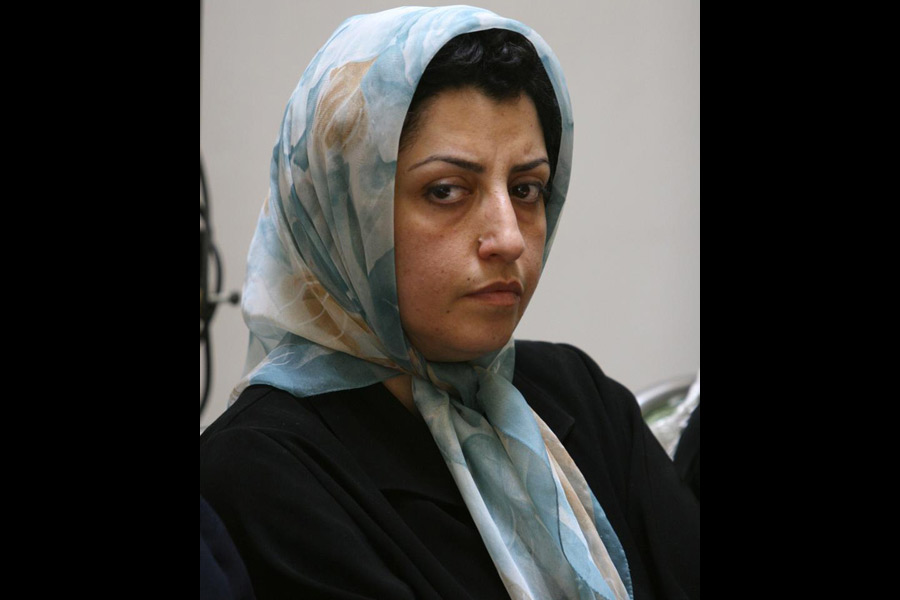 |
| Manmohan Singh after unveiling Jawaharlal Nehru’s statue in JNU. (Below) Students shout slogans during the Prime Minister’s speech. Pictures by Rajesh Kumar |
 |
New Delhi, Nov. 14: For a split second, a flicker of irritation flashed across the Prime Minister’s face.
He had not said a word to the students gathered at the JNU sports stadium, not provoked them in any way, had just about risen from his seat when they started.
“Manmohan Singh murdabad, down with the Prime Minister,” hollered a section of students in the stands, booing and waving black banners protesting against the Iran vote and asking the Prime Minister to go back.
Manmohan had been invited to JNU to unveil a statue of Jawaharlal Nehru on his birth anniversary but before he could quote the first Prime Minister’s thoughts, pandemonium had broken.
A red-faced JNU vice-chancellor was seen profusely apologising to Manmohan as chancellor Karan Singh and HRD minister Arjun Singh ? also guests ? watched on uneasily. Harried students’ union leaders and the rector were appealing for calm, but to no avail.
A minute later, the Prime Minister began: “If universities discharge their duty adequately, then it is well with the nation and the people.
“But if the temple of learning itself becomes a home of narrow bigotry and petty objectives, how will the nation prosper or a people grow in stature?”
By then, the din had grown deafening. Clashes had broken out between police and the protesters, suspected to be activists of the radical Left All-India Students’ Association, and between them and the Congress-backed National Students’ Union of India.
“A university provides the environment in which we evolve as responsible citizens of the world. We learn here the art and science of seeking truth,” continued the Prime Minister, unfazed.
“We learn here the principles of engaging in a dialogue. We learn here as much as we unlearn. For both learning and unlearning are two sides of the same coin of seeking truth, of seeking knowledge.”
Then the punch line to the protesters: “We also learn in a university how to deal with difference of opinion. For, in expressing one’s own opinion freely, we implicitly recognise the right of another to similarly express a different opinion freely.”
Manmohan, an honorary professor of the university since 1976, said he owed his rise to the country’s top post to academic institutions, which were key to reducing social disparities.
“We must ensure that we can offer access and seek excellence in our universities.? Education reduces disparities provided we can ensure that even as we pursue excellence, we can assure access.”
As the protests continued ? there were sections that were appreciative, too ? the script appeared to be unfolding from the past. Prime Ministers Indira Gandhi and Rajiv Gandhi, too, had faced similar behaviour when they visited JNU.
A JNU faculty member said protests at meetings addressed by the Prime Minister had almost become a “tradition”.
The incident has exposed fissures between the Left groups on campus with the Left All India Students’ Association defying the JNU Students’ Association’s official stand to not disrupt the Prime Minister’s speech.
In a meeting yesterday, the JNU students’ union had decided that the protests should be limited to presenting two written memoranda to the Prime Minister. The meeting was presided over by JNU students’ union vice-president Dhananjay (SFI) as president Mona Das (AISA) was absent.
“We do have our differences with the government over which we have submitted a memorandum to the Prime Minister, but we decided not to disrupt his speech,” students’ union joint secretary Arani Sinha said.
When the protests broke out today, Mona Das was missing.
“Where is the JNU students’ union president? The union should disown her as president if she is not here. They made trouble even after the union resolved to protest peacefully by submitting a memorandum,” a faculty member said.
The memorandum opposed the September vote against Iran’s nuclear programme and requested the government to reverse its decision at the November 24 meeting of the atomic energy watchdog. It also demanded a policy decision prohibiting joint military exercises with the US.










